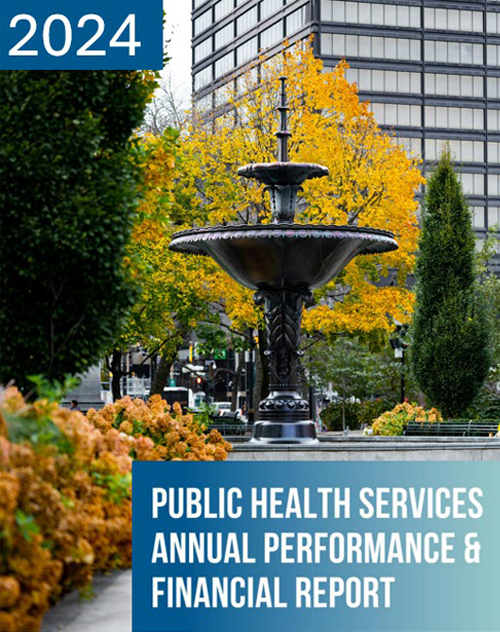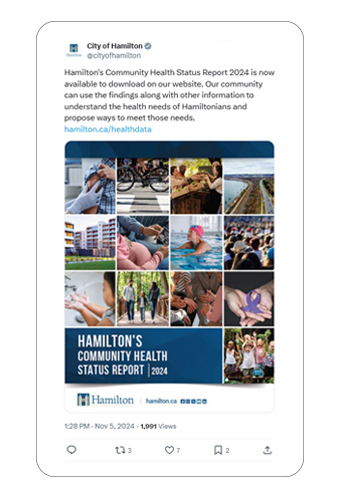


For more information
Email [email protected]
By Mail
100 Main Street West, 6th Floor
Hamilton, ON
L8P 1H6
We are pleased to present the 2024 Annual Performance and Financial Report to the Public to showcase Hamilton Public Health Services’ significant impact on our community. This report focuses on achievements made towards advancing our four priority areas.
What Do We Do?
Hamilton Public Health Services offers a wide variety of programs and services to meet the requirements set out in the Ontario Public Health Standards and support the health and well-being of the Hamilton community. This includes preventing illness and disease through vaccination and case management, promoting healthy habits, and ensuring the air we breathe, the water we drink, the food we eat, and the places we gather are safe. We also work to reduce health inequities by making supports more accessible to those for those who need them most in our community.
Our Priorities

Hamilton Public Health Services has a broad mandate and limited resources, making it important to focus efforts where they will have the greatest impact. Each year, the Hamilton Public Health Services’ Leadership Team revisits their multi-year priorities to ensure they are still relevant and that resources are directed to the most pressing community health needs. This review considers the current context, including updated local community health status information, and the financial and political landscapes at both the Provincial and local levels.
These priorities reflect long-standing health challenges that require sustained, collaborative action across multiple sectors, with Hamilton Public Health Services contributing as one partner among many in these efforts. Because of the complexity of these issues, it can often take several years to see the impact of our work in the community. Many of the actions taken in 2024 will continue over the coming years.
In 2024, the following four multi-year priorities were renewed:
- Health Equity
- Child and Youth Healthy Growth and Development
- Mental Health and Substance Use
- Climate Impacts
2024 Progress Snapshot: Public Health Services’ Priority Areas
Health Equity

Health equity focuses on giving everyone a fair and equal opportunity to be as healthy as possible, regardless of their background, income, or life circumstances. Public health plays a key role in identifying unfair differences in health by adapting programs and services to better meet the needs of those most affected. This helps reduce health disparities and improve overall health outcomes across our community.
Focus Areas
- Competency Development
- Data for Equity
- Community Collaboration
- Demonstrating Impact
Building our staff’s knowledge, skills, and attitudes is essential for effectively addressing health inequities in a meaningful way. When our staff understand the complex root causes of health and social issues impacting our community, they are better equipped to design and deliver programs that meet the unique needs of those most impacted.
Achievements in 2024:
- 93% of staff members completed foundational health equity and anti-racism training, empowering them with tools to apply these principles to their daily work, with 91% of staff indicating the training had increased their knowledge of how to contribute to health equity and anti-racism action at work.
- Our leadership team engaged in an assessment of the organization’s capacity for health equity action. This process helped measure progress, identify gaps, and reinforce our collective commitment to advancing health equity across all levels of the organization.
Collecting, analyzing, and using data to uncover health inequities is essential for driving meaningful change in our community. Strengthening how we collect and use data on the social determinants of health helps us better understand the root causes of health inequities, tailor programs and services to community needs, and assess whether our efforts are achieving the intended impact in the community.
Achievements in 2024:
- Developed health equity-focused key performance indicators for all programs to better monitor our progress toward reducing health inequities in the community.
- Released the Community Health Status Report, which provides key health information, including social determinants of health and health inequities, to guide internal public health planning and service delivery. This report can also be used to support broader community planning, local public policy development, and raises awareness of health issues, fostering a common understanding of the breadth of issues affecting our community’s well-being.
Collaboration with the community is key to addressing health inequities. By increasing engagement with priority populations and community partners, we foster collaboration, inclusivity, empowerment, and a deeper understanding of local needs. Involving community members in co-design efforts help ensure our programs and services are equitable, responsive, culturally safe, and tailored to the diverse needs of Hamiltonians.
Achievements in 2024:
- In developing the Community Health Status Report, we engaged with several community organizations and priority populations, including Black and racialized communities, First Nations, Métis, and Inuit communities, people with other lived experiences of marginalization (e.g., LGBTIQ+ and lower-income populations), and people accessing services in the healthcare sector. This engagement added context and meaning to the data, highlighting lived experiences and the intersectionality of issues.
- The Chronic Disease Prevention Program had 13 community engagement activities conducted with identified priority populations, and there were 18 new and ongoing partnerships with organizations serving those populations.
Established the Indigenous Well-being Advisory Circle to Advance Culturally Safe and Inclusive Health Programs
The Indigenous Well-being Advisory Circle is now formed. It is an important step towards fulfilling a key recommendation from the Indigenous community in the Public Health Services’ Indigenous Health Strategy.
This Circle will act as a trusted voice for community and organizational interest holders, offering expertise and cultural perspectives to ensure health programs and initiatives are inclusive, are respectful of First Nation, Inuit, and Métis knowledges and practices, and are culturally safe for Indigenous Peoples. The Circle will help create spaces where Indigenous Peoples are safe, heard, and supported in their right to Indigenous self-determination and quality care.
– Public Health Services’ Local Access Sites Program Manager
Measuring the impact of our programs is crucial to understanding how well we are addressing health inequities. It helps us know whether we are reaching the people who need our services most and whether we are closing health gaps in the community. It also promotes transparency, strengthens accountability, and helps identify areas where we can further improve.
Achievements in 2024:
- Expanded monitoring and reporting to better track how well our programs are reaching priority populations. For example:
- 2,839 low-income seniors accessed free dental clinic services through the Ontario Seniors Dental Care Program.
- 42% of initiatives undertaken by Chronic Disease Prevention Program were targeting priority populations.
- At discharge, 96% of one-parent families participating in the Healthy Babies Healthy Children’s Home Visiting Program achieved their goals for healthy attachment with their baby or child.
- Continued to increase the visibility of public health efforts by using storytelling and real-life examples through social media and other platforms to ensure that our work is more accessible and relatable to the community.
Child and Youth Healthy Growth and Development

Healthy growth and development focuses on achieving the best possible health through preconception, pregnancy, newborn, child, youth, parental, and family health. Public health plays a key role by providing families with timely information, resources, and programs they need to raise healthy children and youth. This work is especially important as we continue to address the lasting impacts of the COVID-19 pandemic on children’s health and development.
Focus Areas
- Optimal Prenatal Health
- Infant and Early Years Mental Health
- Optimal Health of School-Aged Children and Youth
The prenatal period, from pregnancy through birth, is a key time for the health of both pregnant individual and the baby. Providing the right support during this period can help prevent complications, improve birth outcomes, and give the child a healthy start in life. Supporting the physical and mental health of pregnant individuals during and after pregnancy is key to achieving these goals.
Achievements in 2024:
- Developed strategies to identify individuals with prenatal risk factors, which led to more intake assessments, higher enrollment in prenatal programs, and expanded access to virtual prenatal education. This resulted in connecting 40% of pregnant individuals in Hamilton to prenatal supports, surpassing the 25% target, to ensure timely access to essential information and care.
- Completed 929 prenatal screens through the Healthy Babies Healthy Children Program, connecting those with risk factors during pregnancy to supports that promote healthy birth outcomes. This is a slight increase from 908 prenatal screens completed in 2023.
Welcome Baby Group Provides Much-Needed Support. A client was referred to public health by her obstetrician as she was a newcomer to Canada and was struggling with very low mood and energy and isolation during her pregnancy. After encouragement from her Healthy Babies Healthy Children public health nurse to attend the Public Health Welcome Baby Group in the community, she attended and made lovely connections with other group members from her home country and enjoyed a nutritious meal. She plans to continue with the group to get much needed support from the public health nurse, dietitian and group members during her pregnancy and postpartum period.
– Healthy Growth & Development Program Manager
Mental health in the early years is key to a child’s overall development. The experiences during the first few years of life shape one’s emotional and social well-being, impacting long-term outcomes well into adulthood. Providing support during these early years helps build protective factors and reduce the risk of poor social and emotional development among children aged 0 to 6 years.
Achievements in 2024:
- Led a community planning initiative to improve access to mental health supports for children aged 3.9- to 6-year-olds, which resulted in a new pathway for parents and caregivers to get help, which will be launched in 2025.
- Ensured all children referred to the 0- to 3.8-year-old pathway were connected to appropriate developmental or mental health services.
- 874 children and youth aged 0 to 18 years old received mental health counselling through the Child & Adolescent Services Program.
- Approximately one quarter of all brief counselling sessions were completed in targeted community locations.
- Provided play-based therapy for children aged 0 to 6. Theraplay sessions reached capacity, with 93% of parents and caregivers reporting improved knowledge, ability, or confidence.
Hamilton Public Health Services partners with schools and school boards to support the health and well-being of children. This includes promoting students’ mental health and well-being, improving access to oral health care services, especially for students facing barriers, and increasing vaccination rates to reduce preventable diseases and school absences. Strengthening these school-based supports helps improve overall health outcomes among school-aged children and youth.
Achievements During the 2023-24 School Year:
- Supported 90 Hamilton schools to complete the National Healthy Schools Certification, of which 40 were high-priority schools. This process engages students and adults in creating healthier school communities.
- Completed dental screenings for 16,643 students to catch oral health issues early, prevent dental problems, and promote overall oral health among students. Approximately 9% of children screened had an urgent dental need.
- Enrolled 725 children in the Healthy Smiles Ontario Program to provide free dental care to low-income children.
- Improved vaccine coverage, with 74% of 7-year-olds and 88% of 17-year-olds enrolled in Hamilton schools receiving the Meningococcal vaccine, though this was below the 90% target. Data may not represent true coverage rates, as it relies on vaccines reported by parents.
Mental Health and Substance Use

Improving mental health and reducing the burden of substance use are critical for our community’s health and well-being. Public health plays a key role in supporting individuals facing these challenges through prevention, reducing harms, direct support, and by addressing broader impacts on the community.
Focus Areas
- Trauma and Violence-Informed Care
- Municipal Policies on Substance Use
- Harm Reduction
A trauma- and violence-informed approach recognizes the lasting impact of trauma on the well-being of individuals and the community. Hamilton Public Health Services is committed to embedding principles of safety, trust, and empowerment across all programs and settings. This work is critical to making care more culturally responsive and emotionally and physically safe, especially for those who have experienced trauma.
Achievement in 2024:
- Began integrating trauma- and violence-informed care into its programs to ensure culturally, emotionally, and physically safe services. Early efforts included training select staff to build awareness and capacity, beginning to develop an organization-wide policy, and planning environmental assessments to improve the safety and comfort of public health spaces. This work will continue in the coming years with expanded staff training and broader adoption and application of trauma- and violence-informed care practices across all programs, as well as efforts to promote trauma- and violence-informed approaches among community organizations and services that interact with people who use substances.
Addressing substance use challenges in our community requires a comprehensive, multi-faceted approach. By advancing healthy public policies grounded in health promotion, we can effectively address substance use issues within the community. Evidence-based policies not only strengthen public health initiatives but also work to reduce the impact of substance use on communities.
Achievement in 2024:
- Led the revision of the Municipal Alcohol Policy to align City property events with safe drinking guidelines, promoting healthier, safer events. City Council decided to maintain the 2011 Municipal Alcohol Policy.
Adopting strategies to reduce harms associated with substance use acknowledges the challenges of substance use and prioritizes community well-being. Hamilton Public Health Services is committed to a compassionate, inclusive approach focused on enhancing education, programs, and services to support safer substance use among people who use substances. These strategies aim to promote safer practices, prevent overdose-related deaths, and reduce the spread of communicable diseases. By meeting individuals where they are in their substance use journey, we foster a more inclusive and compassionate approach to well-being.
Achievements in 2024:
- Re-engaged the Hamilton Drug Strategy Steering Committee to identify priority substances.
- Advanced strategic plans through the Alcohol and Opioid Working Groups, in collaboration with community partners.
- Supported 14,173 clients to access supplies to reduce the risk of harms associated with substance use.
- Increased the number of eligible external stakeholders distributing naloxone kits by 79% through the Ontario Naloxone Program, well above the 20% target.
- Increased the number of community partner agencies providing supplies by 38% through the Ontario Harm Reduction Distribution Program, surpassing the 10% target.
- Hamilton Public Health Services’ Quit Clinics worked effectively for their target populations, where 33% of clients who identified with having mental health concerns were smoke free at their 12-month follow-up, and 37% of clients whose annual before tax income was <$60,000 were smoke free at their 12-month follow-up. For reference, according to Cancer Care Ontario, only 1.9% of Ontarians who quit smoking stay free for at least 12 months.
Alcohol, Drug & Gambling Services Program Provided Access and Support
An individual referred themselves to Public Health Services’ Alcohol, Drug & Gambling Services (ADGS) Program. They were looking for support to stop drinking and were not sure what help was available and how to take their first step. They spoke to an ADGS social worker who provided information about supports, and together they decided that inpatient treatment would be a good fit. A further assessment was completed, and a referral was sent to the inpatient program they had chosen. During the wait for their admission to treatment, they were supported by their ADGS counsellor with regular check-ins and supportive counselling to help them feel confident and ready to go to treatment. Their primary care physician helped with completing medical forms and working with having their medication available when in treatment. The individual successfully entered treatment and returned to the Hamilton community feeling more confident to continue with the positive changes they made during treatment.
– Alcohol, Drug & Gambling Services Program Manager
Climate Impacts

Promoting healthy built and natural environments that support health and mitigating existing and emerging risks, including the impacts of a changing climate, are important to protecting the community’s health. Public health plays a key role in raising awareness about heat-related illnesses and the spread of infectious diseases, while also developing strategies to help the community adapt and build resilience.
Focus Areas
- Vector-Borne Diseases
- Extreme Heat and Health
- Emergency Management
Climate change is increasing the risk of vector-borne diseases in Hamilton. Warmer temperatures and shifting weather patterns allow disease-carrying vectors, like mosquitoes and ticks, to spread into new areas, putting more people at risk. Understanding how climate and health are connected is key to preventing illness and protecting our community. To reduce the illness of vector-borne diseases in the community, Hamilton Public Health Services is increasing surveillance, improving early detection, and raising public awareness of climate-sensitive vector-borne diseases in order to reduce the incidence in the Hamilton community.
Achievement in 2024:
- Conducted active surveillance through field collection of ticks in natural areas, and passive surveillance by identifying ticks submitted by the public. These efforts help detect ticks that transmit diseases of public health significance and guide prevention efforts in the community, resulting in 74 reported local cases of Lyme Disease.
The impact of extreme heat, which has worsened by a changing climate, poses serious threats to the community’s health. Rising temperatures increase the risk of heat-related illnesses and deaths, especially among vulnerable populations such as older adults, people with chronic health conditions, and those with limited access to cooling. Hamilton Public Health Services is working to reduce these risks by promoting healthy built and natural environments and mitigating the impacts of climate change by advancing efforts to raise public awareness, improve access to supports, and strengthen community preparedness and resilience during heat events.
Achievements in 2024:
- Held 13 focus groups with a total of 133 community members and shared information about the hazards of extreme heat exposure along with protective measures to decrease the potential of heat-related illness.
- Launched a real-time heat-related illness situational report to monitor the local population health impacts of extreme heat and support decision-making during heat events.
- Distributed 748 “Cool Kits” to individuals identified as highly vulnerable to extreme heat, providing them with practical tools to stay safe during heat events.
- Partnered with the City of Hamilton’s Recreation Division to distribute more than 1,500 Hamilton Street Railway bus tickets, helping residents access designated community-wide “cool places” during a heat warning of any duration.
The Board of Health approved the Community Heat Response Strategy
Increases in heat-related illness and deaths are projected with future climate change impacts in the City of Hamilton. In 2024, the Health Hazards & Vector-Borne Diseases Team developed Hamilton’s Community Heat Response Strategy outlining 10 actions aiming to implement a comprehensive approach to extreme heat and population health protection. Through the use of innovative mapping tools, Wards 2, 3, and 4 in the City were identified as areas of greatest vulnerability and greatest exposure to extreme heat. This information is used to support targeted heat-related actions in the City of Hamilton. The actions focus on both individual interventions, such as education and outreach, which included conducting focus groups with residents vulnerable to the impacts of heat exposure to better understand their lived experiences of trying to stay cool during hot weather. Also, other actions include those with greater potential impacts that change the environmental context to make individuals' default decisions healthy, like planting trees and installing shade structures.
– Health Hazards & Vector-Borne Diseases Program Manager
Climate change increases the frequency and severity of health-related emergencies, such as extreme heat, cold, flooding, and wildfire smoke. These events can lead to increased illness, injury, and death, especially among vulnerable populations. To address these health risks, Hamilton Public Health Services is working to ensure the community is prepared and health systems are equipped to respond effectively during climate-related emergencies. This includes raising public awareness, supporting early action, and helping residents stay safe when faced with climate-related health threats.
Achievements in 2024:
- Implemented a mandatory emergency preparedness training module for all staff, providing foundational knowledge on public health-related legislation, the incident management system, and staff roles during emergencies.
- Delivered public health messaging through media interviews on the health impacts of wildfire smoke, extreme cold, and heat-related illness.
Hamilton Public Health Services’ Funding Data

Most of Hamilton Public Health Services’ programs are funded using a Provincial/Municipal cost-shared model, except for the Ontario Seniors Dental Care Program, which is 100% Provincially funded. Hamilton Public Health Services also provides additional services beyond those required under the Ontario Public Health Standards to address local needs. These services are either 100% Provincially funded (Child & Adolescent Services, Alcohol, Drug & Gambling Services, Healthy Babies Healthy Children, Mental Health & Street Outreach Program) or 100% Municipally funded (Municipal Dental Treatment Program).
- As part of our journey to Build Back Better and Stronger, we are transitioning, restoring, and enhancing our financial systems to enable us to move from the manual process we have relied on to a new financial software system, which will enable us to provide complete, accurate, reliable, and timely financial reporting. As such, minor adjustments may occur once the transition is complete.
- This report outlines financial information for programs under the Ontario Public Health Standards, as required within the Standards. For 2025, with the updated financial system, financial information and performance will be included for all of Hamilton Public Health Services’ programs.





